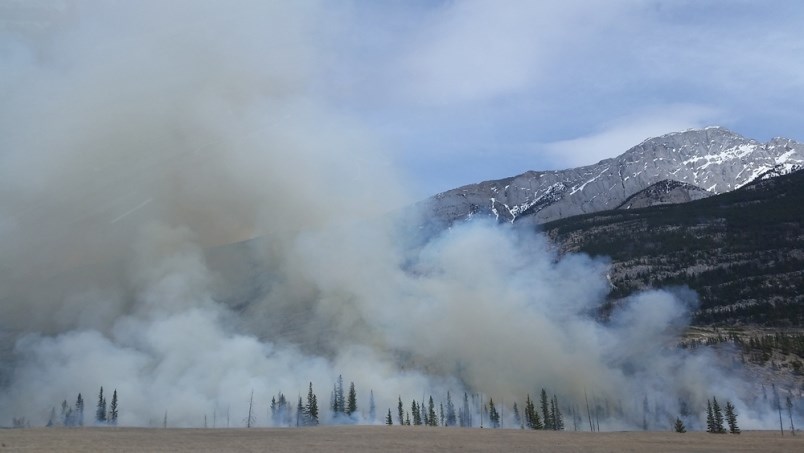A local parent is raising concerns over the lack of information and protocol available to Pemberton residents when the air quality is unhealthy. David Rossellat advocated for a reliable notification system at a council meeting on Tuesday, Nov. 21.
Rossellat said the long-term effects of the high concentration of very fine smoke particles are still unknown. Fine particulates (PM10 and PM2.5) are directly emitted by many sources, including from industry and cars. In the Sea to Sky corridor, the main sources of these particulates are usually wildfires.
Vancouver Coastal Health (VCH) uses an Air Quality Health Index (AQHI) to help people understand what the air quality means for their heath.
According to VCH’s website, poor air quality is of particular concern for those who are more vulnerable, including older adults, pregnant people, infants, those who have underlying medical conditions such as lung or heart disease, chronic obstructive pulmonary disease (COPD), and people with respiratory infections.
These groups are advised to stay in air-conditioned spaces or facilities with cooler filtered air, such as arenas and libraries, when the air quality is poor. Mild respiratory symptoms related to poor air quality includes a sore throat, cough, and shortness of breath.
However, Pemberton does not currently have a way of notifying residents when the air quality poses a risk to public health. Rossellat previously lived in other parts of the world, where he felt information was more readily available with effective steps in place.
“I’m not getting an email from a principal or a soccer coach when the air quality is bad,” he said. “I lived in South Asia, and during similar situations, I would receive a notification.”
The local man uses the IQ Air app to monitor the evolving air quality situation, particularly during wildfire season. He included screenshots in his presentation to council. On Friday, Sept. 15, Pemberton’s air quality was listed as “unhealthy” on the app.
Rossellat raised his concerns about kids playing during recess when the air quality is unhealthy with the principal of L’École de la Valée. Her reply on May 27 was: “Our air-quality guidelines and protocols for schools come from Vancouver Coastal Health. We have not received anything for today.”
The father felt Pemberton residents should get email or text notifications when the air quality is bad so they can take appropriate measures.
“If you live in Whistler and it’s a really bad air-quality day, you’ll get some sort of notification. We don’t get anything,” he said. “More often than not when we have wildfires, it is worse in the valley than up in the mountains.”
David Karn from the Ministry of Environment and Climate Change said real-time monitoring is not currently taking place in Pemberton. The Ministry issues two types of public notifications during periods of poor air quality in collaboration with local health authorities. They include Smoky Skies Bulletins and Air Quality Advisories (AQA).
“Smoky Skies Bulletins (SSB) are specific to wildfire smoke and are issued on a regional basis,” Karn said. “Regions included in each bulletin are, or are expected to be, notably impacted by wildfire smoke within the coming 24-48 hours. Bulletins are based on several information sources, including measurements (where available), wildfire smoke models, satellite imagery, citizen science PM sensors, etc. Almost all areas are covered by the SSB system. Pemberton is within the region named ‘Whistler.’”
Meanwhile, AQAs are issued to communities when local emissions sources are driving poor air quality.
“Advisories are issued based on pollutant concentrations measured in a particular community,” said Karn. “Hence, advisories can only be issued for communities where real-time monitoring is conducted within the provincial ambient air-quality network. Currently, this type of monitoring is not conducted in Pemberton.”
Particulate matter (PM2.5) has been measured in Pemberton since September 2005. Six continuous PM2.5 stations were also installed in the village over the following years. They are located inside and outside municipal hall, outside the community centre, up Pemberton Meadows, at the industrial park, and at the wastewater treatment plant. Live data from these sensors is available on monitoring app PurpleAir.
Mayor of Pemberton, Mike Richman, said council will investigate the issue further.
“I think you bring forward some really interesting points. I would like to understand better how [Vancouver] Coastal Health approaches air quality and what they are working off,” he said. “This is definitely something that we can follow up. We will start by following up with Vancouver Coastal Health and seeing what our neighbours are doing. We can learn from other communities.”
According to a statement from Vancouver Coastal Health provided after Pique's weekly press deadline, the Ministry of Environment is responsible for air quality monitoring and notifications for the area, and AQAs outside of the Metro Vancouver region are issued by the Ministry.
"Since 2022, Vancouver Coastal Health has been carrying out a Portable Air Quality Sensor project to provide rural and smaller communities with additional air quality information, including setting up six monitors in Pemberton with partnership from the Village of Pemberton," a VCH spokesperson said.
"The data from these sensors allows residents and local organizations to have better access to live local data, to increase awareness of wildfire smoke and winter wood smoke conditions in their local community and to take action in response to local conditions."
Vancouver Coastal Health also works with local communities and residents to better understand air-quality data and take appropriate actions to protect health, the spokesperson said.
More information about the Portable Air Quality Sensor project can be found here at Air quality monitoring projects | Vancouver Coastal Health (vch.ca)




